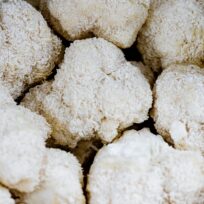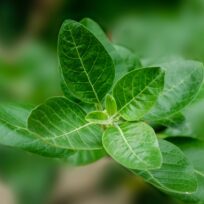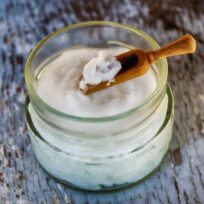Lions Mane
OTHER NAME(S): Bearded Tooth, Crinière de Lion, Hedgehog Fungus, Tree Hedgehog, Monkey Head, Pom Pom, Hydne Hérisson, Satyr's Beard, Yamabushitake.
Not just adorning the neck of a magnificent large wild cat, Lions Mane is also the name of a mushroom. A very special mushroom in fact as this particular mushroom, can make you smarter. It works by providing your brain cells with the optimum environment they need in order to regenerate themselves. Pretty cool, right? Sounds great! But a great claim without evidence doesn't wash here so let's get into the science a little bit and see if there's any substance to the apparent benefits of this magical mushroom. And if you're wondering, no, it's not an actual magic mushroom - sorry about that.

So, Mushrooms?
Yes, mushrooms! There are thousands and thousands of edible and inedible mushrooms in the world but how do you know which ones are safe and which ones are right for you? Mostly, this process of learning can take a looong time and many people give up through confusion and a lack of understanding. This is a great shame. Yes, there are mushrooms out there that might be dangerous and there are also those famous ones that alter your state of consciousness - but - there are also many other types of mushrooms out there that we here at Happy Healthy and Wealthy don't think are talked about enough. It's our mission to educate and inform about our own experiences in an effort to help others on their own journey of discovery. It is always important to do your own research about your own body, any existing health conditions you may have, existing medications you're taking and how using various mushrooms may impact your state of being. But, I urge you to not let the overwhelming amount of information and options available put you off. With a little learning and an open mind, mushrooms might just hold the naturally derived answer for your particular concern.
Okay, so what actually is Lions Mane?
Lions Mane (Hericium erinaceus) grows on dead or decaying hardwood trees, such as oak. It normally has a white fluffy appearance with long strands that resemble, you guessed it, a lions mane. The mushroom has been used for centuries in East Asian medicine and is still trusted by many today as one of the most effective treatments for some very serious ailments.
Healthline says, "Lion’s mane mushrooms contain bioactive substances that have beneficial effects on the body, especially the brain, heart and gut. This could Protect Against: Dementia, Help to Relieve Mild Symptoms of Depression and Anxiety, Speed up Recovery from Nervous System Injuries, Protect Against Ulcers in the Digestive Tract, Reduce Heart Disease Risk, Help Manage Diabetes Symptoms, Help Fight Cancer, Reduce Inflammation and Oxidative Stress and Boost the Immune System". Additionally, some people who are taking these mushrooms have reported improved mental clarity, control over ADHD symptoms, better skin and hair, the list goes on and on. Pretty big claims, right? Even if the words might, may and could are scattered everywhere when researching this (or any other) mushroom, I'm sure we all know that in times of desperation when it comes to health, might, may and could are more than enough to make it worth looking into.
Also, in 2008, a double-blind, parallel-group, placebo-controlled trial found that lion’s mane effectively improved cognitive function in a randomised group of 15 older adults. Rodent studies found that lion’s mane potentially may have protective effects on brain cells, improve memory and promote the creation of new neurons. Lions mane helps to rid the brain of amyloid plaque as well as helping to build myelin sheaths at the same time. Amyloid plaque is an enemy of healthy neurons, it is a protein that impairs cognition and has been heavily associated with neurodegenerative conditions. Myelin sheaths are sleeves of fatty tissue that protect your nerves, including those in the brain and spinal cord. Think of the myelin sheath like a protective communication system between your nerve cells. When healthy, the myelin sheath allows electrical impulses to transmit quickly along the nerve cells, improving function and when they're damaged, or not operating as well as they could, this process becomes slower.
Sounds too good to be true. If it was this good wouldn't everyone already know about it?
According to WebMD, "Lion's mane mushroom might improve nerve development and function. It might also protect nerves from becoming damaged. It also seems to help protect the lining in the stomach."
In true WebMD fashion, they do go on to say there is no "good scientific evidence to back this up". Now, from their point of view I can see why they're saying this - however - I would be inclined to disagree. The thing about "scientific evidence" in the "eyes of science" is that it normally needs money, quite a bit of money (and political sway, but that's another topic), to prove something works and funnily enough, the people who've created and sold other solutions for hundreds of years, aren't normally rushing to find natural alternatives to man made medicines.
If the people who are from Earth could heal and thrive with the help of natural, Earth made substances, then the people making synthetic or lab produced medicines would suffer huge financial losses. We might not like it, we definitely don't agree with it but that is the truth about why Big Pharma isn't digging deep to get this type of research funded. It just doesn't make good business sense. But what about in the health of people sense? Shouldn't that be what is most important here? Shouldn't that what is always the most important? And, if that is in fact the case, shouldn't we really have some "good scientific research" about the benefits of natural medicine by now? These are not new fad's or a passing craze, it is widely accepted that they've been around and used successfully for centuries. So, why don't more people know about it!? Surely, a solution provided by Mother Earth, from whence we all came, is at least worth exploring? We think this turn in the tide is long overdue and believe that people have a right to access all the information before making choices about what to put in their own bodies.
Not all supplements are created equal.
Like most things, you can get good quality and not so good quality versions so how do you know what to look for when purchasing your first Lions Mane order? Here, we'll share our 7 points to consider before you add anything to cart.
- Is the company reputable? Does the company have a demonstrated history of delivering quality products with a high customer satisfaction rate? The best way to find out about how something may affect you is to learn about how the same thing has affected other people, just like you. Real reviews by real people are a good place to start.
- Are binders and/or fillers used in the company's supplements? Touted by some to be a crucial part of supplement manufacturing, a binding agents' purpose is to bind a tablet or medicine together to stop it falling apart. Fillers are used as bulk so that your capsules look fuller. As these excipients (fancy term) have no medicinal properties according to the American Pharmaceutical Review, we at HWW would always opt for a clean version that didn't include any of these (what we feel are) unnecessary nasties. After all, what is the point in spending your hard earned money on a sub-par solution that might be less likely to work? If you're going to give supplements a chance, give them a real one. We know it can be tempting to choose these often much cheaper alternatives but as the saying typically goes, you get what you pay for. And, don't forget that the reason they're cheaper is because binders and fillers themselves, are cheap. If you've decided to take the leap into the pool of natural medicine, it's probably best to jump into clear water rather than water scattered with rocks of potentially unseen danger. You can read more about 'The Hidden Dangers in Your Dietary Supplements' from the American College of HealthCare Sciences.
- What is their customer service offering? If you're not happy with your purchase or the service, it's good to know that you will be able to speak with someone directly. The last thing you want is to be left high and dry with a product you can't use and a company that you can't contact.
- Where do their products come from? Is information available from the supplying company about where their ingredients come from? As with anything you put in your body, it's important to know exactly what it is so you can make the most informed choices.
- How are their mushrooms grown? Are your mushrooms grown naturally or in a lab? As you've probably gathered by now, we here at HHW believe natural is best, always.
- Polysaccharides, Triterpenoids and Beta-Glucans. What's the difference and how do you know what to look for? Polysaccharides are the main active compounds in medicinal mushrooms. Top Tip: just because the Polysaccharides % is high, doesn't necessarily mean the quality is good. This is because the % of Polysaccarides can sometimes come from Alpha-Glucans, rather than Beta-Glucans in the form of starches and fillers. As mentioned earlier, those Alpha-Glucans provide no medicinal benefit. Beta-Glucans are the most scientifically studied health promoting compounds which come from the fungi itself and this is where you'll get your benefit. This is one of the reasons why it is important to make sure that your supplement provider is clear and honest about the contents of their product and what compounds make up the supplement. Research in mice has shown that long term use of Beta-Glucans from mushrooms enhances temporal order recognition memory and synaptic protein levels. ScienceDirect.com says "Triterpenoids are widely found in plants. It is found that triterpenoids have a variety of pharmacological activities including anti-inflammatory, anti-diabetic, anti-cancer, regulation of immune function etc."
- Powder or capsule? After you've done your research, you might be wondering which is best, powder or capsule? The truth here is that there's no right answer. Some people find the ease and convenience of capsules easier to manage whereas others may enjoy the typically reduced cost that comes with powder alternatives. Personally, I choose capsule every time. I've had powders in the past and have always found them to be messy and more work which can make you less likely to keep up to date taking them.
Love,
Happy Healthy and Wealthy.
Join the movement
Quick link to our recent most favourite products

Lions Mane

Ashwagandha

Marine Collagen

Rosewater

Coconut Oil
Happy Healthy and Wealthy is your place to discover your happiest, healthiest and wealthiest self. You're already amazing, just as you are so let's grow together and become truly incredible.
Everyone's invited!
Join the monthly Happy Healthy and Wealthy newsletter now and never miss a beat! We want you and your incredible self to join the movement where you'll enjoy becoming part of our valued community. It's a place to share insights, thought provoking questions and journey towards being your best self. We promise to never spam you and we will never share your data. You can unsubscribe at any time - although we doubt you'll want to!
If you're interested in collaboration, please contact us through the link, we'd love to hear from you.
